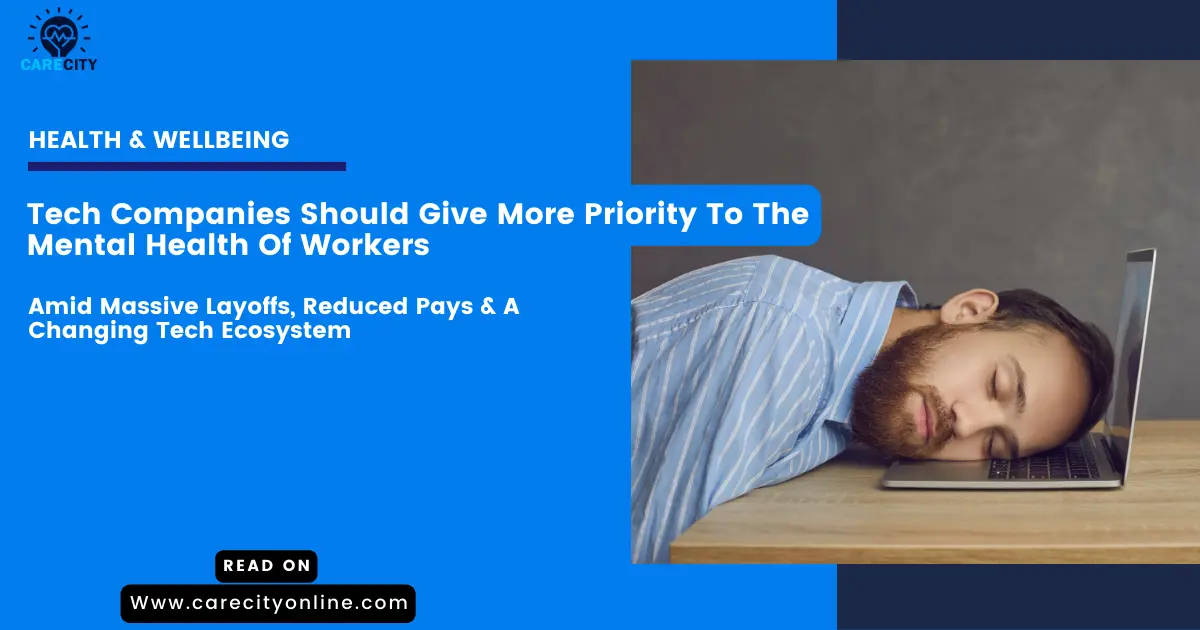Mental Health Should Be A Priority

The unfortunate and sad news of workers committing suicide in big tech companies is of grave concern.
Many may not commit suicide, but the pressure and stress placed on them—those affected by layoffs and those who remain and are forced to face demanding performance management systems will definitely take a toll on their mental and physical health.
The performance measures big tech companies may have enacted over the past few months to improve efficiency are excellent and welcoming; nevertheless, the approach should be more professional and should show deep concern for people.
The focus shouldn’t just be on company performance, metrics, investors, etc.
They must also give as much concern as they give to revenue to the people who work night and day to keep the company alive.
Reading of suicide and mental stress ravaging tech employees (both those laid off and those remaining) is disturbing and reveals a lot of inadequacies in the social support some big companies provide for their workers.
These companies have the resources to ensure their workers get the best mental health care.
Neglecting them in a time like this doesn’t speak well of them, and lasting and effective interventions must be implemented fast before it spirals into a workplace epidemic we might be unable to handle.
Isn’t it already a workplace epidemic? Plenty of available data gives us a glimpse at the overall state of employees’ mental health.
For example, in Japan, around 2,968 people committed suicide due to work-related issues in 2022 alone.
The recent historical tech layoffs have only exacerbated an already existing problem.
At Google, about three employees have committed suicide (according to reports and available data) since the company, around July 2022, began to put in place certain workplace regulations, including hiring slowdowns followed by earth-shattering historical layoffs and rigorous performance management systems.
There isn’t enough data about work-related suicides in the tech ecosystem yet, and we should expect more news about mental struggles among laid-off tech workers. If nothing is done about it fast, we’ll have a big problem.
How Can Tech Companies (and companies in general) Help?

Companies that care about people know what to do to ensure their people are happy and productive.
The HR department of any company must be aware and equipped to address issues like workplace mental health stress. They are strategies that the HR department can implement to eliminate suicide in the workplace. It takes extra work but is worth it.
- Design policies that strengthen advocacy for employees with mental challenges in the workplace: Executives and leaders must be considerate and humane when designing workplace policies. Work has become an important aspect of our social life in the modern world. We can’t do without it. So, it is essential to create a work environment that is both comfortable and safe for individuals.
- Train all employees on how to support and care for employees with mental challenges: Emotional intelligence training must be provided for all employees in an organisation—training on how to take care of people and react and adjust to different personalities, especially people with mental health challenges. Taking steps like these will provide a conducive environment for challenged workers and act like a soft landing even when the worse or unexpected happens.
- Provide professional support for employees during tough and challenging times: There are certain circumstances we might not be able to control, like sudden economic downturns that adversely affect companies and businesses warranting companies to take drastic steps, like laying off employees so that the business can survive. However, companies that truly care for people must be cautious when laying off staff. They must ensure that they provide professional counselling and mental health services for all employees or employees with fragile mental health. Even after employees have been laid off, it still makes sense for companies to design strategic mental health outreach programmes to follow up on former workers’ health status, especially those with mental health challenges.
How Can We Help?

Aside from institutional help, co-workers still have significant roles to play in the fight against workplace-related suicides and mental stress.
- Be Vigilant and Observant: Most people who commit or attempt suicide have underlining mental health problems. And most times, they exhibit these symptoms during social interactions. In periods of stress, employees must look out for those predisposed to mental stress and offer helping hands where necessary. You have to be ready and prepared to give help, so you’ll need to nurture a “be available” mindset. When you observe someone showing signs of struggling, you can warmly reach out to them and support them the way you can.
Know the signs
If you can detect abnormal behaviours among fellow workers, it’s much easier to intervene, underscoring the importance of training.
Some signs of suicide ideation to take note of at work: isolation and loneliness at work, poor job performance, sudden personality change, previous suicide attempts (this info may be private), threats or expressions like “I don’t care about this job or anyone here,” or “You guys might not see me again tomorrow or forever.”
Other habits include; depression, burnout, chronic persistent absenteeism despite several warnings, lack of interest, repeated mistakes despite corrections, use of drugs during work like alcohol, odd social media posts, and poor financial habits.
- Be Available: Sometimes, being available can save the life of an individual struggling with mental health issues. Most people just want someone to talk to and pour out their hearts. You can be that someone. It doesn’t cost you anything—just your time and heart. If more people at work can build an available mindset, it would go a long way in making the workplace a safe and conducive place for everyone to work in.
- Avoid Stigmatisation: Respecting people at work is a vital attribute that modern workers must nurture. Stigma has the potential to destroy lives. Everyone is unique in their own way, and we owe it to them to respect their uniqueness, especially if it’s something they can’t entirely control, like mental struggles or challenges.
Africa’s Tech Ecosystem Needs To Learn

Africa’s tech ecosystem might not be as big yet, but we are getting there; this is the best time to learn from whatever is happening in the global tech ecosystem.
Though layoffs have also hit our tech ecosystem here, the effects can not be compared with what’s happening at Google, Facebook or Microsoft.
Budding tech companies in Africa need to start implementing strategies and building a culture that will secure employees’ mental health in the future.
As the tech industry in Africa expands, it’s essential that we learn all we can.
We must understand that prioritising employees’ health is as important as working to make a profit or increase revenue.
Growing with this mindset puts us on the right path to building great and successful companies that genuinely care about people.
Further reading
- Suicide In The World: Global Health Estimates | WHO
- Work-related suicides: the UK’s invisible crisis | Red Pepper






Drop Your Comment